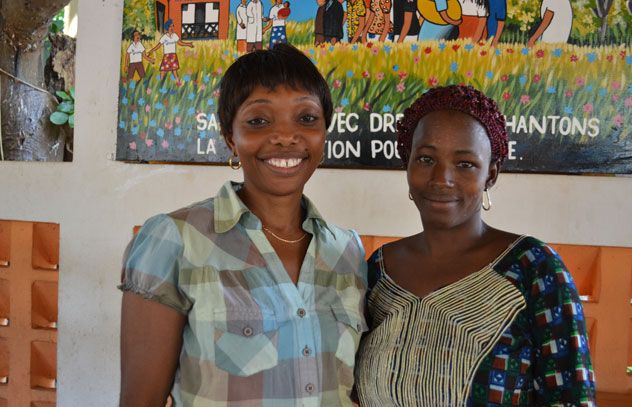

Djamilatou (right) and Fatoumata Sylla, coordinator of the WFP-supported Dream Centre clinic in Conakry. WFP food rations have been an important part of the support Djamilatou has received. (Credit: WFP/Katharina Dirr)
Feature Story
Guinea: WFP nutrition support helps a mother rise to the challenge of living with HIV
31 January 2014
31 January 2014 31 January 2014A version of this story first appeared at www.wfp.org
Djamilatou lives in the suburbs of Conakry, the capital of Guinea. Every week, the 34 year-old mother comes to the Dream Centre—a walk-in clinic that supports people living with HIV by offering HIV treatment, advice and, thanks to the World Food Programme, nutritious food.
It was during her first pregnancy that she discovered she was HIV-positive. "I went to the hospital, because I always felt sick," she says. After some tests, the doctor gave her the news. “At first, I really couldn’t believe it. It was a huge shock. I had never ever considered that HIV could affect me.”
A friend advised Djamilatou to go to the Dream Centre and she says this advice changed her life. "Before I came here, I had lost a lot of weight and strength. I would have never had the money to buy all the medicine for the treatment.”
But the most important thing for her was the support and advice she received to help her through a complicated pregnancy and the birth of her child by caesarian. “I am very thankful that both of my children are healthy. My son Alpha is 3 years old and my little daughter Mariama just turned 5 months. At the centre, I also receive nutrition education to make sure that she grows up healthy and strong.”
Now Djamilatou’s nutritional status is stable, as is her health and she is hoping to start working again soon. For her the centre is not only a place where she receives treatment and nutrition, it is a place that gives her hope.
As clinic coordinator Fatoumata Sylla maintains, “The social side of the weekly food rations is really important: for some patients they are one of main reasons for coming regularly… This gives us the chance to build a stable relationship with our patients.” In addition, the nutrition support provided by WFP has a special impact on the progress of their treatment.
“The nutritional needs of people living with HIV are higher because of their weakened immune system,” explains Ms Sylla. “We can improve the effectiveness of our treatment when we supply the patients not only with medication, but also with nutritious food.”
Like Djamilatou, more than 650 other people living with HIV receive treatment at the Dream Centre every month. WFP also provides with Supercereal + sugar (CSB+), a specialized micronutrient vitamin and mineral mix that helps to quickly improve the nutritional status of people living with HIV. The amount of the CSB+ ration depends on the body mass index (BMI) of each patient. In addition, the World Food Programme also supports family members of people living with HIV with rations of rice and oil fortified with vitamins A and D.


